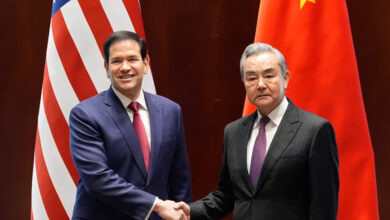
India said on Monday it had withdrawn a visa to an exiled Uighur leader whom China has long branded a terrorist, provoking criticism from the opposition that it had buckled to pressure from Beijing.
China blames unrest that has killed hundreds of people in its far western province of Xinjiang on Islamist militants looking to establish an independent state for the mostly Muslim Uighur ethnic minority.
Dolkun Isa, executive chairman of the Munich-based World Uyghur Congress, planned to attend a conference this month in India's northern hill town of Dharamsala, the seat of the Tibetan spiritual leader, the Dalai Lama.
Isa's World Uyghur Congress is a leading ethnic Uighur group that advocates democracy and human rights. Exiles and rights groups say the Xinjiang unrest is more a reaction to repressive government policies than organized by any cohesive militant group.
New Delhi granted Isa a tourist visa in a sign that Prime Minister Narendra Modi's government was ready to break from the past, when it had discouraged a visit by the top exiled Uighur leader, Rebiya Kadeer, in 2009.
But on Monday, an interior ministry spokesman said Isa's electronic visa had been withdrawn, without giving a reason for the decision.
"A visa was given to him. That has been canceled," the spokesman said. The foreign ministry directed queries to the interior ministry.
The announcement came after domestic media quoted the Chinese Foreign Ministry as saying Isa was wanted by China and Interpol had put out a "red-corner" notice for his arrest.
Isa said he was disappointed by the decision to block his travel to a conference aimed at exchanging ideas among different ethnic and religious communities.
"I recognize and understand the difficult position that the Indian government found itself, and regret that my trip has generated such unwarranted controversy," he said in a statement on the group's website.
Modi's administration has sought a more assertive posture in its relations with neighbors and erstwhile foes, Pakistan and China, as it seeks to expand commercial ties.
India reacted angrily this month to China's decision to put a hold on its request to add the head of the Pakistani militant group Jaish-e-Mohammad, or the Army of Mohammad, to the United Nations' al Qaeda-Islamic State blacklist.
Some political supporters of Modi's government saw the initial grant of the visa as a response to Beijing's decision to side with Pakistan over the militant leader operating from the neighboring country.The flip-flop provoked opposition criticism. "Modi's latest foreign policy disaster on China can be termed a Himalayan blunder," said Sanjay Jha, a spokesman of the main opposition Congress party.




